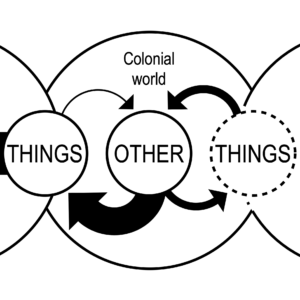decolonizing design
-

Coloniality of Making in Design Philosophy
Van Amstel, Frederick M. C., Gonzatto, Rodrigo F., and Saito, Carmem. Coloniality of Making in Design Philosophy. In: Secomandi, Fernando and Verbeek, Peter-Paul (Eds.). Design Philosophy after the Technology Turn, 41–60. London,: Bloomsbury Visual Arts, 2026. http://dx.doi.org/10.5040/9781350494480.ch-3 - Jan 6, 2026 -
 Abstract: Decolonizing design confronts the deep-rooted structures of colonialism that still shape international aesthetics, production, and trade relationships. The coloniality of making divides “thinking” in developed nations and “making” in underdeveloped ones, generating a nostalgic feeling for colonial styles thought and made for others. By fostering autonomous development and critical consciousness, decolonizing design encourages innovative […] - Feb 16, 2025
Abstract: Decolonizing design confronts the deep-rooted structures of colonialism that still shape international aesthetics, production, and trade relationships. The coloniality of making divides “thinking” in developed nations and “making” in underdeveloped ones, generating a nostalgic feeling for colonial styles thought and made for others. By fostering autonomous development and critical consciousness, decolonizing design encourages innovative […] - Feb 16, 2025 -
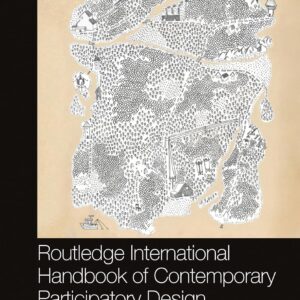
Decolonisation and Participatory Design
Winschiers-Theophilus, H., Smith, R. C., Amstel, F. V., & Botero, A. (2025). Decolonisation and Participatory Design. In Smith, R. C., Loi, D., Heike Winschiers-Theophilus, H., Huybrechts, L. & Simonsen, J. (Eds.). Routledge International Handbook of Contemporary Participatory Design. Routledge. https://doi.org/10.4324/9781003334330 - Dec 25, 2024 -

Transdisciplinarity is transgression or it is not
Throughout the 20th century, there were many attempts to make design into a single and unified discipline, similar to (or even engulfing) architecture. These efforts failed as new design disciplines kept popping up and creating distinctive professions. The possibility of disciplinary unification under elusive labels like design studies became less and less realistic as designers […] - Dec 20, 2024 -

Systemic userism in service design
Abstract: Userism in service design manifests as a group of humans reduced to be users (and only users) of a given service. Userism prevents these people from cocreating, codesigning, and coproducing services. Transnational (often colonialist) digital services are a case in point; however, userism also appears in analog interfaces. The systemic aspect of userism refers […] - Nov 25, 2024 -

Anticolonial prospects for overcoming the coloniality of making in design
Saito, C., Freese Gonzatto, R., and van Amstel, F. (2024) Anticolonial prospects for overcoming the coloniality of making in design, in Gray, C., Hekkert, P., Forlano, L., Ciuccarelli, P. (eds.), DRS2024: Boston, 23–28 June, Boston, USA. https://doi.org/10.21606/drs.2024.255 - Jun 17, 2024 -

Decolonizing Service Design Ethics and Aesthetics
Abstract: Service Design draws heavily from ancient Greek Ethics and Aesthetics, beginning with the foundational theater metaphor that separates frontstage from backstage. When Service Design engages with cultures that do not cultivate the Greek canon, the decolonization challenge comes to the fore. People who work to decolonize their cultures wonder whether Service Design will remain […] - Apr 15, 2024 -
 Abstract: The never-fulfilling promise of a bright future has justified modern colonization for centuries. Modern design follows suit. Modern design has been exported to former colonies as a neutral, non-political way of making. The futures that came with them have contribute to maintain the coloniality of making, nurturing a sense of nostalgia and a conservative […] - Feb 28, 2024
Abstract: The never-fulfilling promise of a bright future has justified modern colonization for centuries. Modern design follows suit. Modern design has been exported to former colonies as a neutral, non-political way of making. The futures that came with them have contribute to maintain the coloniality of making, nurturing a sense of nostalgia and a conservative […] - Feb 28, 2024 -

Prospecting anti-colonial qualities in Design Education
Mazzarotto. M., Van Amstel. F. M. C., Serpa, B. O., Silva, S. B. (2023). Prospecting anti-colonial qualities in Design Education. V!RUS Journal, 26, 135-143. Translated from Portuguese by Giovana Blitzkow Scucato dos Santos. Available at: http://vnomads.eastus.cloudapp.azure.com/ojs/index.php/virus/article/view/833 - Dec 26, 2023 -

Pluriversal Futures for Design Education
Noel, L.-A., Ruiz, A., van Amstel, F. M. C., Udoewa, V., Verma, N., Botchway, N. K., Lodaya, A., & Agrawal, S. (2023). Pluriversal Futures for Design Education. She Ji: The Journal of Design, Economics, and Innovation (Vol. 9, Issue 2, pp. 179–196). https://doi.org/10.1016/j.sheji.2023.04.002 - Sep 3, 2023 -

El hacer como quehacer: notas para un diseño libre
En América Latina, la colonialidad del hacer nos impide valorar lo que ya hemos hecho y, a partir de ahí, hacer lo que hay que hacer. A menudo preferimos importar el diseño europeo en lugar de construir sobre gambiarras y otras formas populares de diseño. En Brasil, sin embargo, la resistencia a la colonialidad del […] - Apr 21, 2023 -

The coloniality of making and its resistance in Brazil
Summary: The coloniality of making refers to international relations of production that overvalue intellectual labor in developed countries and undervalue manual labor in underdeveloped countries. Design discipline plays a crucial role in maintaining the coloniality of making, establishing hierarchies between modes of designing existence in the world. The colonized populations’ ways of designing are considered […] - Dec 3, 2022 -

Diseño y la colonialidad del hacer
Keynote addressed at the 13th International Conferences on Design History and Studies, Universidad de Bogotá Jorge Tadeo Lozano, October 2022. Resumen: La colonialidad del hacer se refiere a las relaciones internacionales de producción que sobrevaloran el trabajo intelectual en los países desarrollados y subvaloran el trabajo manual en los países subdesarrollados. Al garantizar esta desigualdad […] - Oct 23, 2022 -
 SURU’BA (“good thing” in Tupi and “orgy” in Portuguese) is the final work of João Conrado Dembiski and João Victor Tarran in their Bachelor in Design at UTFPR. Inspired by anarchist and decolonial thinking, the duo designed a modular open-source furniture system that could be cheaply produced in Curitiba, the locality of their studies. Their […] - Jul 30, 2022
SURU’BA (“good thing” in Tupi and “orgy” in Portuguese) is the final work of João Conrado Dembiski and João Victor Tarran in their Bachelor in Design at UTFPR. Inspired by anarchist and decolonial thinking, the duo designed a modular open-source furniture system that could be cheaply produced in Curitiba, the locality of their studies. Their […] - Jul 30, 2022 -
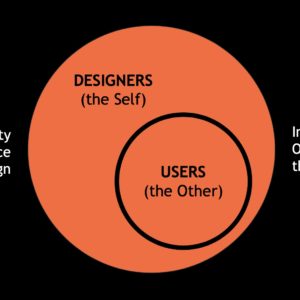
Radical Alterity in Experience Design
Abstract: In Experience Design, we typically learn to design experiences for others, the users. While drawing this distinction between us and them, we block the potential to change who we are by designing for ourselves. Radical alterity means including the Other as part of the Self. It is a concept crafted on decolonial Brazilian anthropophagic […] - Jun 22, 2021 -
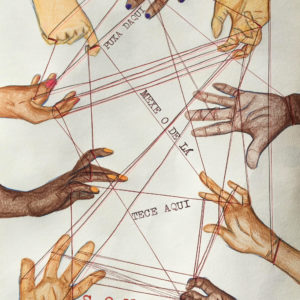
Monster aesthetics as an expression of decolonizing the design body
Angelon, Rafaela and Van Amstel, Frederick M.C. (2021) Monster aesthetics as an expression of decolonizing the design body. Art, Design & Communication in Higher Education, 20(1), pp. 83-102(20). https://doi.org/10.1386/adch_00031_1 - Jun 9, 2021 -
 This panel conversation was recorded at Uroboros 2021 Festival. It explores the possibility of returning to the wild, or bringing the wild back to human creative practices. Frederick contributed with comments on using this concept to decolonize design and art from domesticated attitudes, based on body discrimination and hierarchies. At 31:30, he performs a cat […] - May 17, 2021
This panel conversation was recorded at Uroboros 2021 Festival. It explores the possibility of returning to the wild, or bringing the wild back to human creative practices. Frederick contributed with comments on using this concept to decolonize design and art from domesticated attitudes, based on body discrimination and hierarchies. At 31:30, he performs a cat […] - May 17, 2021 -

Pluriversal Design Methods and Critical Ontological Design
Pluriversality might help recognizing ways of designing and knowing that have been ignored by universal methods of design, such as vernacular and indigenous techniques. Looking at design methods through an ethical perspective, scrutinizing their intentions, and choosing alternatives beyond the universal may be called Critical Ontological Design. This philosophical idea can be summarized as such: […] - May 6, 2021 -

The Invasion of the Gringo Design Thinker (2021)
On the World Theatre of the Oppressed Day on March 16, 2021, the Design & Oppression Network broadcasted a forum theater called The Invasion of the Gringo Design Thinker. The play proposes a debate about the relevance of foreign design thinking to Brazilian popular culture and its forms of expression. Following the remote forum theater method, […] - Mar 4, 2021 -

Decolonizing whatever-centered design
Centralization is a spatial practice used by human collectives for thousands of years. It started in the archaic definition of village leaders and evolved to world empires, including their corollary transnational companies. Centralization promises to better organize society through the gathering of resources and information generated in a vast territory in a small space: the […] - Jan 19, 2021 -
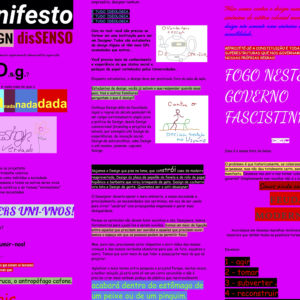
Manifesto Design Dissenso (2019)
The Manifesto Design Dissenso is writen by the Design for Social Innovation class of 2019 at UTFPR. Students decided to write it after looking critically at their technical education and the lack of political perspectives. The manifesto was written and designed using several collaborative tools, such as clay, textiles, and Google Docs across several weeks […] - Nov 8, 2019
